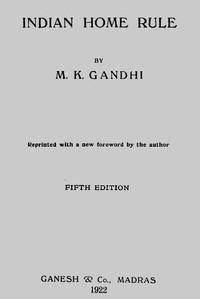Indian Home Rule by Mahatma Gandhi
"Indian Home Rule" by Mahatma Gandhi is a political treatise written in the early 20th century. This work addresses the concept of self-governance for India, arguing against the use of violence and advocating for non-violent resistance as the means to achieve independence from British rule. Gandhi critiques modern civilization and its detrimental effects on moral and social values, urging a return to India's traditional, moral way of life. The opening of "Indian
Home Rule" sets the stage for a deep philosophical and political discourse. Gandhi engages in a dialogue with a hypothetical reader willing to question the prevailing authority of British rule, exploring the roots of discontent and the impact of political institutions like the Congress. He asserts that the desire for Home Rule arises from a collective consciousness among Indians, ignited by events like the Partition of Bengal. Gandhi emphasizes the importance of understanding the spiritual and ethical dimensions of the struggle for freedom, encouraging Indians to adopt self-rule not just as a political objective, but as a renewal of their identity and moral strength. The discussion introduces significant themes such as civil disobedience, the rejection of violence, and the moral responsibilities linked to the quest for Swaraj (self-rule). (This is an automatically generated summary.)
Read or download for free
| How to read | Url | Size | |||
|---|---|---|---|---|---|
| Read now! | https://www.gutenberg.org/ebooks/40461.html.images | 215 kB | |||
| EPUB3 (E-readers incl. Send-to-Kindle) | https://www.gutenberg.org/ebooks/40461.epub3.images | 99 kB | |||
| EPUB (older E-readers) | https://www.gutenberg.org/ebooks/40461.epub.images | 101 kB | |||
| Kindle | https://www.gutenberg.org/ebooks/40461.kf8.images | 177 kB | |||
| older Kindles | https://www.gutenberg.org/ebooks/40461.kindle.images | 148 kB | |||
| Plain Text UTF-8 | https://www.gutenberg.org/ebooks/40461.txt.utf-8 | 186 kB | |||
| Download HTML (zip) | https://www.gutenberg.org/cache/epub/40461/pg40461-h.zip | 90 kB | |||
| There may be more files related to this item. | |||||
Similar Books
About this eBook
| Author | Gandhi, Mahatma, 1869-1948 |
|---|---|
| Title | Indian Home Rule |
| Note | Reading ease score: 73.1 (7th grade). Fairly easy to read. |
| Note | Wikipedia page about this book: https://en.wikipedia.org/wiki/Hind_Swaraj_or_Indian_Home_Rule |
| Credits |
Produced by sp1nd, Cathy Maxam, ewkent, raviarya and the Online Distributed Proofreading Team at http://www.pgdp.net (This file was produced from images generously made available by The Internet Archive) |
| Language | English |
| LoC Class | DS: History: General and Eastern Hemisphere: Asia |
| Subject | India -- Politics and government -- 1919-1947 |
| Subject | Nationalism -- India |
| Category | Text |
| EBook-No. | 40461 |
| Release Date | Aug 9, 2012 |
| Copyright Status | Public domain in the USA. |
| Downloads | 209 downloads in the last 30 days. |
| Project Gutenberg eBooks are always free! | |

